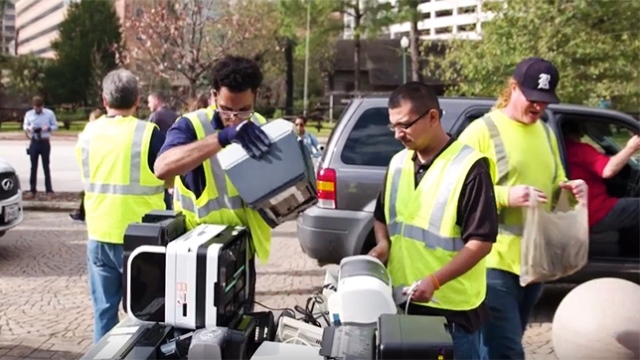
Verizon sponsors a recycling collection rally in Houston. Image source: Verizon
Consumers and business leaders are demanding that corporations contribute more to society.
Corporate communications professionals can play a leading role in advocating and promoting their organization’s contribution to society.
Laurence D. Fink, founder and chief executive of BlackRock, the world’s largest investment company says corporations must contribute to society if they want BlackRock’s support. BlackRock manages more than $6 trillion in investments and has significant influence over corporate board selections. In other words, Fink has the clout to enforce his view.
“Society is demanding that companies, both public and private, serve a social purpose,” Fink wrote in a draft of the letter shared with The New York Times. “To prosper over time, every company must not only deliver financial performance, but also show how it makes a positive contribution to society.”
A Trend to Greater Corporate Social Responsibility
The Times calls the statement a watershed moment in the trend to greater corporate social responsibility. Fink’s argument may also cause controversy, as many executives believe that a company’s main goal is to earn profits.
Yet research reveals that corporate social responsibility improves long-term business performance. In addition, surveys show that consumers prefer to patronize businesses with strong histories of social responsibility and are more likely to purchase stocks of companies with solid ethical records.
These are some recommendations on how companies can complete corporate social responsibility programs and how PR can lead the way.
How PR Can Lead Corporate Social Responsibility Efforts
Promote volunteerism. Most businesses don’t have millions of dollars to donate. But they can embed social responsibility into their foundation by convincing employees to volunteer to help nonprofits, says Jeremy Roche, president of FinancialForce.com, in Entrepreneur. Employees can develop a sense of pride by accomplishing charitable tasks together.
Form a committee. An official committee can lead volunteer events, recommend new activities and keep those efforts alive. Rotating people in and out of the group periodically helps prompt new ideas and prevents people from becoming burnt out.
Make it fun. Volunteering should feel like a privilege, not a chore. Volunteer time off (VTO) policies encourage employees to volunteer and build loyalty to your company. “It should be a time that employees value, a time when they can step away from the chaos of their workday and get to know people outside of their departments, forge new bonds and help their local communities,” Roche says.
Complete research and planning. The first step for PR is to complete an audit of social media habits and an inventory of needed communications materials such as news releases, fact sheets, biographies and articles, advises Kristie Byrum, assistant professor of public relations and media law at Bloomsburg University of Pennsylvania. Create a calendar of communications activities.
Employ media monitoring and measurement. “Before you speak, write or engage with your community, listen and observe trends,” Byrum says. Social media monitoring tools can monitor sentiment toward specific topics. Monitoring can reveal myths and misperceptions about the social responsibility program and key messages that resonate with stakeholders. The CSR program can be adjusted to emphasize campaigns that resonate.
Consider employees’ views. Supporting charities or causes that employees already care about helps sustain interest. Larger companies can examine employee demographics. TCC, a Verizon Premium Wireless Retailer, initiated a buying local program after realizing that most of its employees are millennials, an issue that millennials often support, according to Forbes.
Get customers involved. Employees at a Pennsylvania store asked customers to make a cash donation to the local youth center, donate gardening tools and supplies to help build its garden, or to bring in old books to expand its library.
Publicize your work. Aggressively publicize the company’s cause marketing and CSR activities. However, emphasize the cause, the charity and the measurable impact to avoid being perceived as self-promotional.
Bottom Line: Corporations are being called on to demonstrate how they contribute to society. Effective, well-publicized CSR programs build goodwill for the company, attract loyal customers, and increase shareholder value. As corporate social responsibility gains attention, company PR departments can help plan, lead and publicize their company’s charitable efforts.
William J. Comcowich founded and served as CEO of CyberAlert LLC, the predecessor of Glean.info. He is currently serving as Interim CEO and member of the Board of Directors. Glean.info provides customized media monitoring, media measurement and analytics solutions across all types of traditional and social media.




